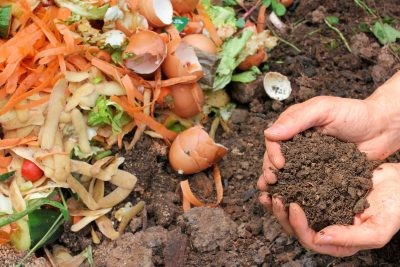
My school, UNC Chapel Hill, implemented an initiative a few years ago to promote composting. A green compost bin, resembling a miniature version of a recycling bin, joined the scores of recycling bins and two large dumpsters that constituted the waste management for my dorm and one other. The bin was labeled with instructions detailing what could and could not be composted, so that those unfamiliar with composting could participate. Bins around campus were emptied regularly, and a company took care of the actual composting process, making it easy for students to participate in this eco-friendly waste removal system. Even without a company to help you out, you can compost in your own backyard; all you need is compost bin and some food waste!
Compost bins come in a variety of sizes and prices, so no matter your living situation, composting is possible. You can even find tutorials on how to build your own compost bin online, such as this one, which can significantly decrease the cost.
When you buy or make a compost bin, there are a few guidelines you should follow. You should make sure that air can flow through the bin, whether through holes in the sides or the open design of the bin, or simply by being careful not to pack waste in too tightly. There should be some room for air flow, whether between twigs and leaves, or through air holes, because composting is an aerobic process, meaning it requires air. The air helps break down the waste, turning unappealing food scraps into rich, organic fertilizer.
It is also important when composting to only put certain waste in the compost bin. Put all your waste from fruits and vegetables in the bin, as well as paper products, and wooden utensils. Do not put meat, dairy products, glass, bones, recyclable materials, or trash in your compost bin. A good rule of thumb for composting is; if it rots, it’s in the right spot!
You can put yard waste in your compost bin, including grass clippings, but be careful to limit the quantity. Too many grass clippings can smother the compost, so be sparing in your use of grass clippings.
A common myth that discourages many people is that you have to “turn” your compost regularly. You do not have to turn compost, but it is helpful in aeration and decomposition if you stir it around with a broomstick or a shovel. A complete turn is not necessary, and can be discouraging for people who are not physically able to do so or feel that it will be too much work. Have no fear, your food will still compost even if you don’t turn it!
Composting is a great way to decrease your landfill waste and make your own fertilizer safely and easily. Get out there and do some composting! Were you inspired to start composting after reading this? Share your pictures or stories with us on our Facebook page (Piedmont Environmental Alliance) or tag us in your Instagram posts @peanorthcarolina
Elizabeth Mitchell is a junior at UNC Chapel Hill and is a summer intern for PEA. She has been interested in environmentalism from a young age, and is majoring in political science and sustainability.